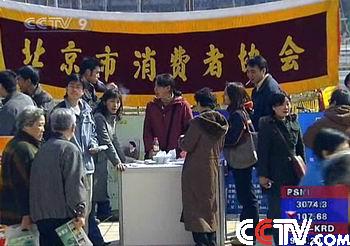China
Consumers "get the wrong end of the bargain"
WATCH VIDEO
Source: China Daily | 03-15-2007 08:36
On the eve of World Consumer Rights Day, industry and commerce officials vowed to better protect consumers, but a survey released a couple of days ago showed the rights of 44.1 percent of consumers had been "seriously violated".
Results of a China Consumers' Association study show most of the victims complained about "fake and shoddy products", "false advertisements misleading consumers" and "unaffordable house prices".
 |
| Video: Chinese consumers voice their top concerns >> |
Other complaints focused on issues such as "frequent food safety scares", "quality of mobile phones", "defrauding consumers" and "inferior house renovation".
But such incidents may be fewer in future as the government tries to create an orderly consumption environment to better protect consumers' rights.
Vice-Minister of the State Administration for Industry and Commerce Wang Dongfeng said yesterday that the administration would strengthen supervision on the market and intensify its crackdown on illegal cases this year.
"The administration is the main government department to implement the Law on Protection of Consumers' Rights and Interests, and is duty bound to protect the rights of the consumers," Wang said. The law was promulgated in 1993.
The administration will accord priority to food safety, commercial bribery, false advertisements, pyramid sales and trademark infringement, he said.
"It will intensify supervision on food quality and supply by setting up an efficient monitoring network and emergency response mechanism," Wang said.
Related: What Chinese consumers are complaining about
What they are complaining aboutChinese consumers lodged about 740,000 complaints last year, of which 520,000 were about products and the rest about services, according to a recent report by the State Administration for Industry and Commerce.
Digital products:
The numbers of complaints about cameras and video cameras were 3,096 and 1,247, a rise of 51.76 percent and 40.43 percent year on year.
High-end digital products such as LCD and PDP TV sets, and digital cameras drew the most complaints.
Consumers often found it difficult to return sub-standard products; and some of the advertisements were exaggerated.
Interior materials and furniture:
There were 13,258 complaints about interior materials, and 12,983 about furniture.
The main problems included low quality of wooden floors and glazed tiles, shoddy furniture sold at high prices, and misleading concepts of new technology.
Nutritional food:
About 5,047 complaints were about nutritional or health food.
The problems included exaggeration of benefits in advertisements featuring celebrities and promotions disguised as free physical check-ups.
Light electric vehicles:
Light electric vehicles bikes powered by electricity also drew many complaints. They centered on poor-quality storage batteries and brakes, and a lack of after-sales services.
Telecom service:
There were 49,414 complaints about telecom services, of which those about mobile telecom services topped the list.
Consumers complained about telecom operators' unilateral action on various kinds of short message services, fraudulent and pornographic text messages, and inaccurate telephone bills.
Catering industry:
There were 17,362 complaints about the catering industry, second highest on the services list. They were mainly about restaurants setting minimum consumption bills, forbidding consumers from bringing beverages or charging high corkage.
Tourism:
There were 3,712 complaints about tourism services, an increase of 63.31 percent year on year.
Some travel agencies were blamed for forcing customers to sign contracts to avoid or reduce liability, changing travel routes and increasing shopping time.
( People's Daily contributed to the story )
Editor:Du Xiaodan



